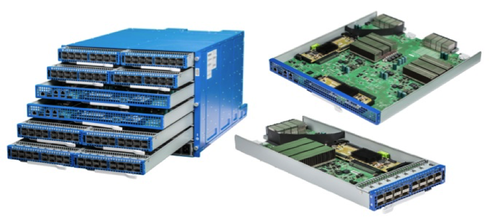Building on its Wedge TOR switch and continuing its quest for disaggregated networking, Facebook on Wednesday introduced what it called the first open hardware modular switch.
The new platform, called "6-pack," is a full mesh non-blocking, two-stage switch with 12 independent switching elements that can each switch 1.28Tbps, Yuval Bachar, hardware engineer at Facebook and lead engineer on the project, wrote in a blog post.
"Each element runs its own operating system on the local server and is completely independent, from the switching aspects to the low-level board control and cooling system," he wrote. "This means we can modify any part of the system with no system-level impact, software or hardware."
6-pack uses as its basic building block the open top-of-rack switch code-named Wedge, which Facebook introduced last year with a Linux-based operating systems called FBOSS. The platform is designed as the core of Facebook's data center fabric, which it unveiled last fall. Facebook described it as the final piece of its data center network.
"With '6-pack,' we have created an architecture that enables us to build any size switch using simple set of common building blocks," Bachar wrote. "And because the design is so open and so modular -- and so agnostic when it comes to switching technology and software -- we hope this is a platform that the entire industry can build on."
Facebook plans to propose contributing the design to the Open Compute Project, which the company launched in 2011. OCP focuses on developing open designs for data center infrastructure components such as racks, servers and storage. Networking was added to OCP agenda in 2013, when Facebook launched the effort that led to Wedge.
In his blog, Bachar reiterated Facebook's reasons for working to break down network components and create modular, disaggregated systems: "As Facebook’s infrastructure has scaled, we’ve frequently run up against the limits of traditional networking technologies, which tend to be too closed, monolithic, and iterative for the scale at which we operate and the pace at which we move."
Facebook has 6-pack, Wedge, and FBOSS in production testing in its data centers.









